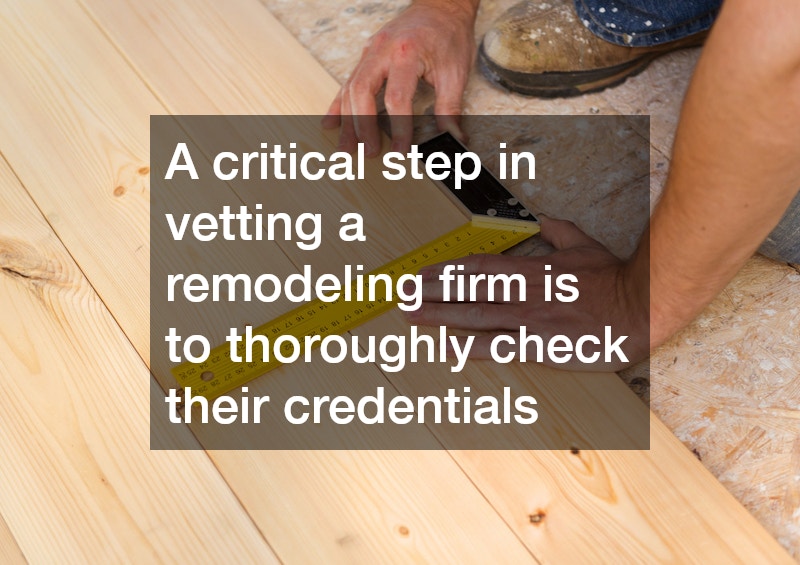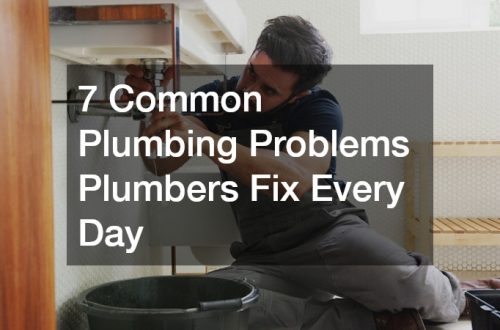
Home remodeling can be a significant investment and a source of stress if not managed correctly. It’s critical to find a trustworthy company to handle your projects, as the wrong choice could lead to dire consequences for your home and finances. A shady home remodeling company knows how to disguise its inefficiencies and untrustworthiness, making them hard to spot. Homeowners need to be vigilant and know what red flags to look for before signing any contracts.
Here, we’ll guide you through the essential signs indicating a company might not be reputable.
Recognizing these warning signals can save you from potential scams, subpar work, and financial distress. Thus, investing time to scrutinize your prospective home remodeler can pay off enormously in the long run. Not only does it prevent wasted resources, but it also secures peace of mind, trust, and satisfaction with the completed project. Given the complexities of modern home improvement efforts, an understanding of these telltale signs can differentiate a delightful home transformation from a renovation nightmare.
The tricks employed by unscrupulous remodeling companies can be as varied as they are sophisticated. From offering lowball estimates that increase mysteriously mid-project to the use of vague or contradictory contracts to trap unsuspecting clients, shady businesses have many tricks up their sleeves. Understanding these pitfalls will provide you with the tools needed to successfully navigate the process of hiring a contractor. This article will equip you with effective strategies to ensure that your home remodeling project is completed efficiently and professionally.
Check Their Credentials
A critical step in vetting a remodeling firm is to thoroughly check their credentials. Start by verifying the legitimacy of their business licenses and insurance coverage. A credible remodeling company should willingly provide this information and display it prominently on their website or business place. Many reputable companies are also affiliated with trade organizations that set high professional standards, an essential credential to confirm. Watch out for companies that are elusive about their credentials or hesitant to share them clearly; these may be indicators of a lack of trustworthiness.
In addition to licenses, review their certifications and professional affiliations. Memberships with organizations like the National Association of the Remodeling Industry (NARI) or the Better Business Bureau can indicate credibility and adherence to industry standards. Such associations usually require rigorous compliance with industry benchmarks and a commitment to ethical practices. Hence, a remodeler with these affiliations is often more reliable. Your due diligence in confirming these aspects can prevent future headaches and ensure your project is in capable hands.
Moreover, take the time to examine reviews and endorsements from other past clients. Online platforms and local consumer protection agencies can provide insights into a company’s performance history. Consistent negative feedback or unaddressed complaints can signify repeat problems. It’s advisable to steer clear from companies that have multiple unsatisfied customers, as this is often a hallmark of a shady business. Remember that transparency is a cornerstone of trust in any professional relationship.
Be Wary of Unusually Low Estimates
A common tactic of unscrupulous remodeling companies is the provision of unusually low estimates for their services. While everyone loves a bargain, it’s vital to remember that if something seems too good to be true, it probably is. These lowball estimates are often a ploy to attract clients before hiking up the price through hidden charges or additional fees as the project progresses. To protect yourself, obtain multiple quotes and compare them. This approach ensures you understand the reasonable market rate for your project before making any commitments.
When evaluating estimates, pay meticulous attention to the scope of work outlined in each proposal. Sometimes, low estimates omit key aspects of the project, leading to unexpected costs midway through the renovation. Detailed, itemized estimates are a hallmark of transparency and professionalism. If a company is unwilling to provide this, it may indicate their intent to adapt the cost to their favor as time progresses. Communicating clearly and asking for clarifications upfront can avert financial surprises and align mutual expectations.
To avoid falling into the trap of inflated costs, ensure you receive all estimates in writing. This documentation will serve as evidence should disputes arise later. A shady contractor might prefer verbal agreements to avoid accountability and future claims. Insist on a well-detailed invoice that also includes contingency clauses for potential changes or unforeseen issues. Walking away from vague or excessively inexpensive quotes can protect you from escalating expenses and stalled projects.
Inspect Contracts Thoroughly
Shady remodeling companies often exploit vague or misleading contracts to trap clients into unfavorable conditions. It is crucial to inspect every contract thoroughly before signing. Carefully review each term and condition, paying extra attention to warranty clauses, timelines, and payment schedules. Vagueness or excessive fine print can both conceal unfavorable terms. Don’t hesitate to ask for clarifications or seek legal advice if aspects of the contract seem unclear or disproportionately advantageous to the contractor.
Another red flag is when a company pressures you to make quick decisions or forego a comprehensive review of the contract. A trustworthy remodeler will allow you the necessary time to evaluate terms and make informed decisions. Remember, hastiness in such matters can lead to long-term remorse, especially when it involves hefty investments. Ensure that all project details are clearly stipulated, leaving no room for misinterpretation. An attentive reading of the contract is your line of defense against potential exploitation.
Additionally, consider including explicit descriptions of materials, timelines, project phases, and a procedure for handling unexpected changes. This clarity facilitates smooth project execution and minimizes misunderstandings. Any reputable company should make concessions for possible setbacks, including weather or unexpected structural issues, which a vague contract might overlook. A contract that lacks these details may suggest a contractor’s intention to cut corners or evade accountability. Taking these preparatory steps can shield you from undesired results and ensure satisfaction with your remodeling investment.
To conclude, spotting a shady home remodeling company requires vigilance, due diligence, and an understanding of the industry’s best practices. By examining credentials, scrutinizing estimates, and thoroughly reviewing contracts, you reduce the risk of entrusting your home to unscrupulous contractors. Always be proactive in these evaluations as it’s the first line of defense against fraud and poor renovations.
Avoid rushing the process and never settle for questionable contractors tempted by discounted rates or timebound offers. An authentic and ethical remodeling company will be transparent, patient, and willing to address all your queries. They care to uphold their reputation by delivering quality workmanship and satisfying the homeowner’s expectations.
Ultimately, protecting your home remodeling investment starts with recognizing and avoiding shady practices. Empower yourself with knowledge to see through deceitful tactics, and you’ll ensure a positive transformation of your space. By implementing the advice shared in this article, you can confidently navigate the remodelling industry and achieve your home improvement aspirations.






